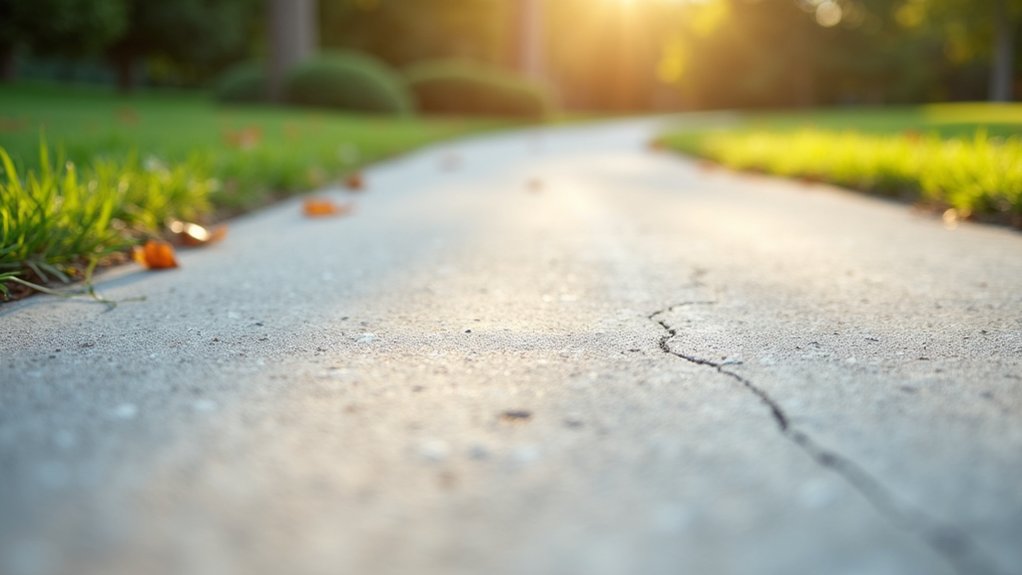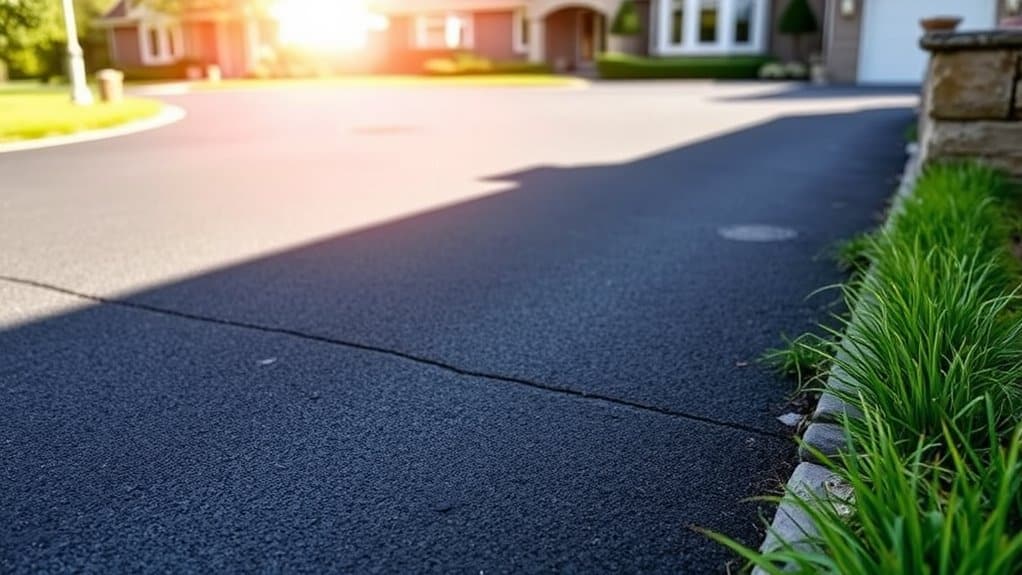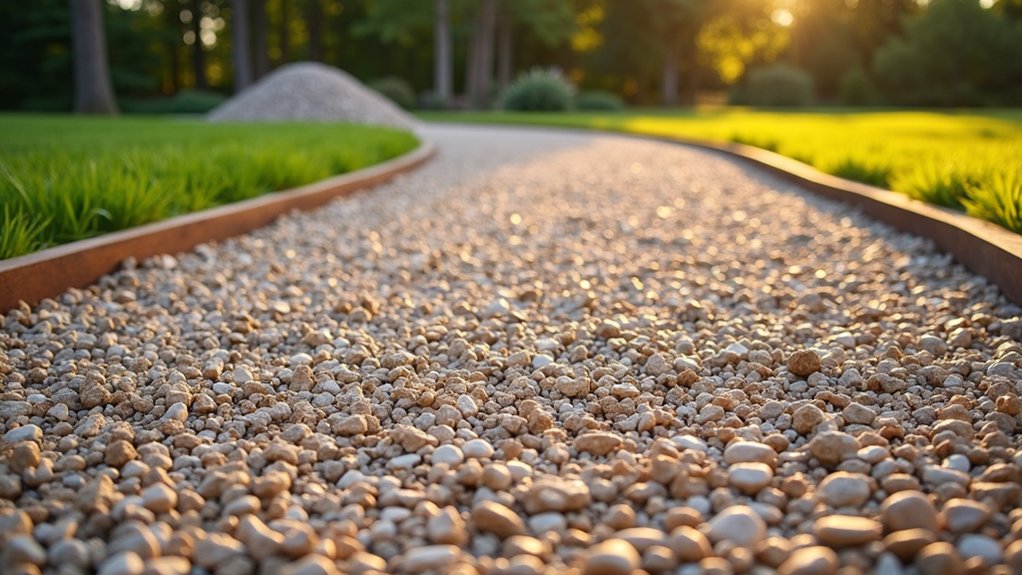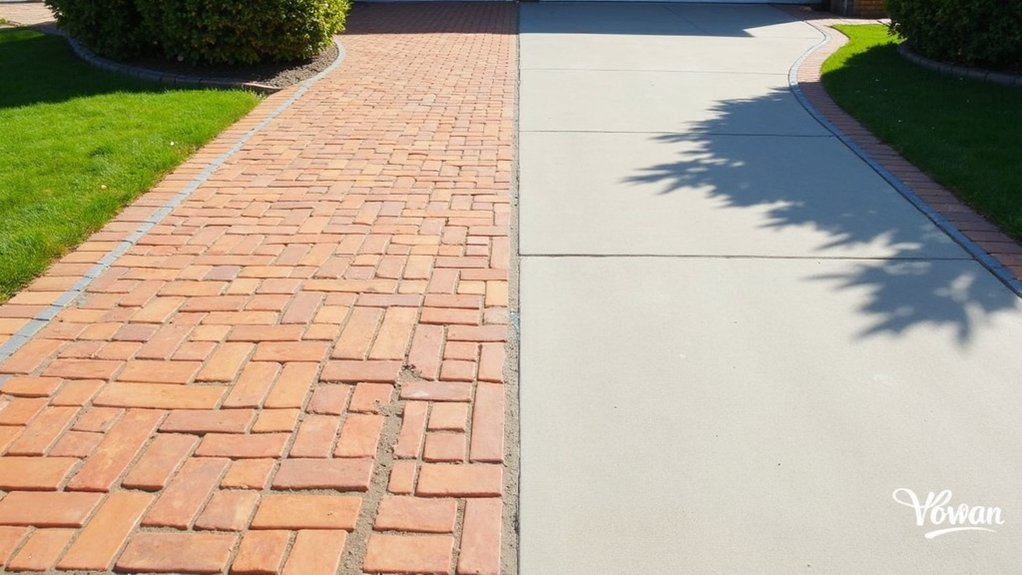A concrete driveway usually lasts between 20 to 30 years, influenced by factors such as installation quality and maintenance. By ensuring proper installation, using high-quality materials, and considering environmental factors, you can extend its lifespan. Regular maintenance, like cleaning and sealing, also boosts durability. Remember, concrete can handle heavy loads better than asphalt. Want to learn more about how to prolong the life of your concrete driveway?
Table of Contents
ToggleKey Takeaways
A concrete driveway generally lasts between 20 to 30 years, with some lasting up to 50 years if conditions are ideal.
The lifespan of a concrete driveway depends on the quality of installation, regular maintenance, and environmental factors. For instance, in colder areas, extreme weather and unstable soil can shorten its durability.
Carrying out regular maintenance, like cleaning and sealing, can significantly prolong its life.
In comparison to asphalt, concrete driveways are more durable and require less frequent upkeep, which can save you money in the long run, even though the initial cost might be higher.
Typical Lifespan of Concrete Driveways
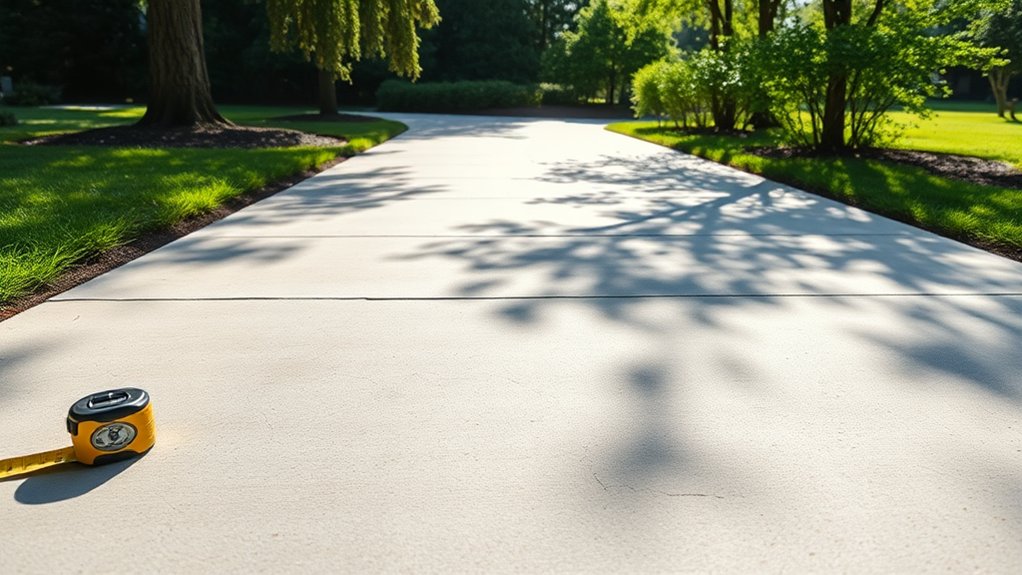
Concrete driveways generally last between 20 to 30 years, with some lasting up to 50 years in ideal conditions. The lifespan can be influenced by factors such as installation quality and maintenance. A properly installed driveway on a solid base will endure longer, whereas colder climates may reduce its lifespan to around 20 years. Regular maintenance can extend its lifespan significantly. While concrete’s initial cost is higher than asphalt, its durability can lead to significant savings over time. A well-maintained, attractive driveway not only enhances your property’s curb appeal but can also boost its resale value. Understanding these factors will help you make informed choices about your concrete driveway’s longevity and investment.
Factors Influencing Lifespan
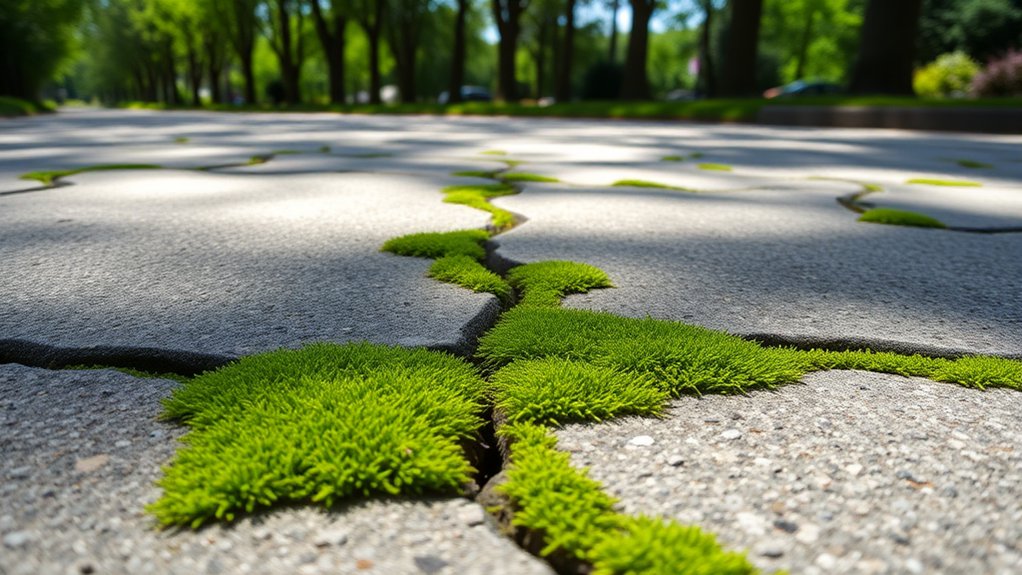
The lifespan of your concrete driveway largely depends on the quality of the installation and the environmental conditions. A proper installation with high-quality materials will significantly improve its durability. For example, extreme weather, such as frost or heavy rain, and soil stability can greatly impact how long your driveway lasts. Therefore, considering these factors is crucial for ensuring it performs well over time. Additionally, regular maintenance is essential for extending the lifespan of your driveway and preventing premature damage.
Installation Quality Importance
When considering the lifespan of a driveway, the quality of installation is crucial for its durability and performance. Good installation methods ensure your driveway lasts longer.
Here are three key factors to remember:
- Concrete Mix Quality: Using a premium ready-mix concrete ensures strength and longevity.
- Subgrade Preparation: Properly compacting the ground and clearing debris creates a stable base, which helps to minimise cracking and settling.
- Curing Techniques: Employing the right curing methods prevents early damage and enhances durability. Additionally, maintaining effective drainage solutions is essential to prevent water accumulation, which can lead to deterioration.
Furthermore, regular maintenance, such as sealing and prompt crack repairs, can significantly extend your driveway’s life.
Environmental Conditions Impact
Environmental conditions significantly affect the lifespan of your concrete driveway. Factors like climate, moisture exposure, and surrounding vegetation can either strengthen or weaken its durability.
For instance, extreme temperatures and freeze-thaw cycles can lead to cracking and deterioration. Excess moisture can weaken the surface and promote mould growth, making moisture control vital.
Additionally, tree roots can penetrate beneath the surface, causing structural damage and unevenness. Intense UV radiation may fade and discolour the driveway, so protective coatings are advisable.
To extend the life of your driveway, regular maintenance practices such as sealing and proper drainage management are essential.
Importance of Professional Installation
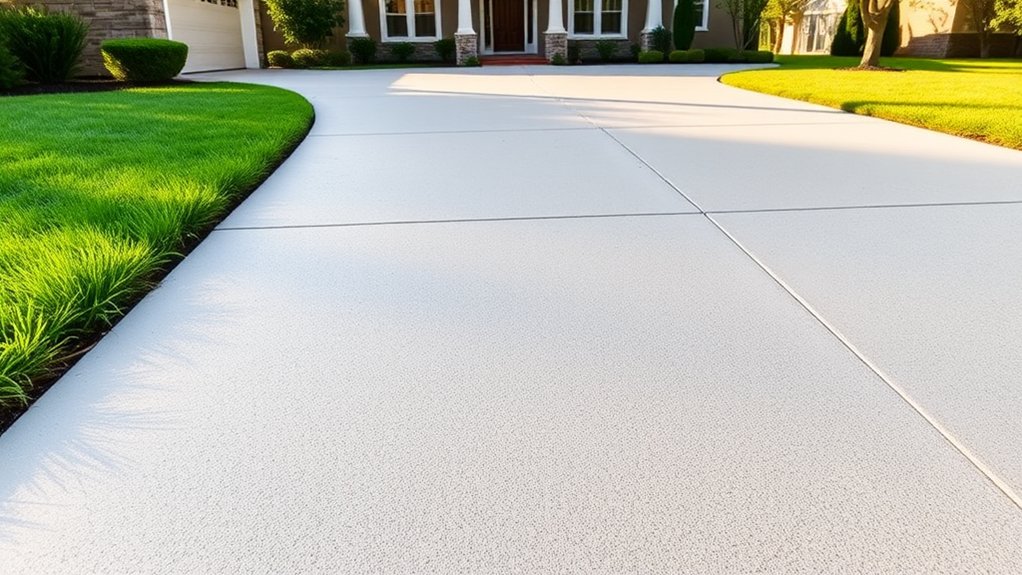
Investing in a professionally installed concrete driveway not only boosts its visual appeal but also significantly enhances its longevity and performance.
Hiring experienced contractors ensures the right installation methods are used, providing several key benefits:
- Design Expertise: Professionals can offer customised design options and efficient project management, ensuring your driveway suits your needs perfectly.
- Specialist Tools: Access to high-quality equipment allows for precise workmanship, reducing the likelihood of errors and increasing durability.
- Cost-Effectiveness: A properly installed driveway lowers future maintenance and repair costs, offering long-term value for your investment.
Quality of Materials Used
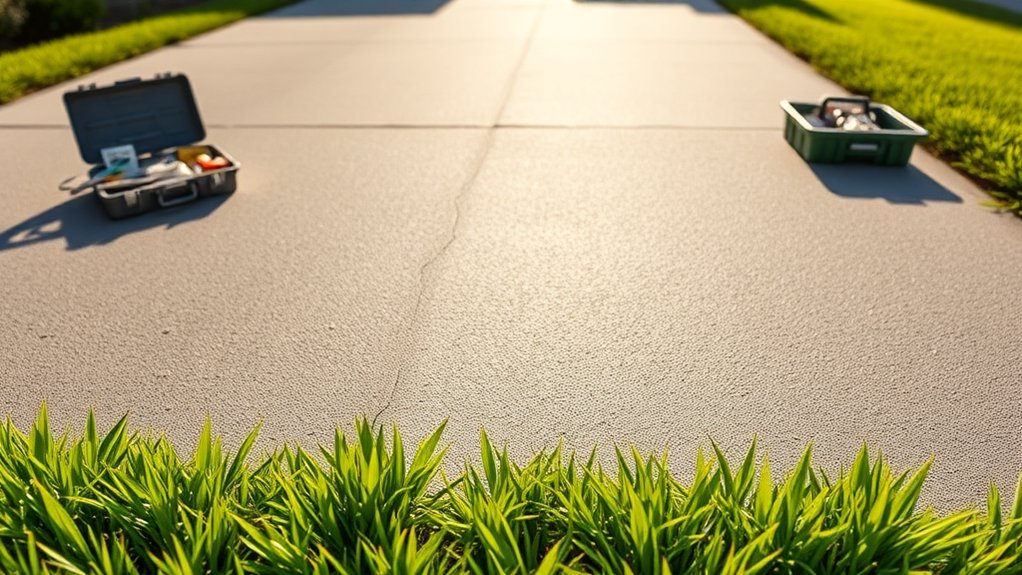
When constructing your concrete driveway, the quality of materials is crucial for its longevity.
Using top-notch concrete mixes, carefully chosen aggregates, and reliable reinforcement methods will ensure your driveway has the strength and durability it needs.
High-Quality Concrete Mixes
To ensure your concrete driveway lasts, it’s crucial to use high-quality concrete mixes.
Here are some key points to consider:
- Water-to-Cement Ratio: Keep the ratio between 0.45 and 0.50 for optimal strength and durability.
- Compressive Strength: Target a minimum compressive strength of 4,000 psi to handle everyday wear.
- Air Entrainment: Use air-entraining additives to improve resistance to freeze-thaw cycles, which helps prevent cracking.
Aggregate Selection Importance
The quality of aggregates in your concrete mix significantly affects your driveway’s performance and lifespan. Choosing durable materials like crushed stone or dense graded aggregates (DGA) improves load-bearing capacity and stability.
Proper sizing and gradation ensure effective compaction and drainage, which are crucial for longevity.
When it comes to aesthetics, aggregates can offer a range of colours and textures, allowing you to personalise your driveway to suit your landscape. Additionally, using recycled concrete aggregate (RCA) supports sustainability and enhances drainage.
Reinforcement Techniques Used
Reinforcement techniques are essential for improving the durability and lifespan of concrete driveways. Selecting the appropriate reinforcement can significantly enhance structural integrity.
Here are three effective options to consider:
- Steel Rebar: This provides excellent load distribution and ensures durability under heavy traffic, with a lifespan of 30 to 50 years when installed correctly.
- Wire Mesh: A cost-effective choice that accelerates installation and reduces surface cracking, lasting around 20 to 30 years.
- Macro Synthetic Fibres: These non-corrosive fibres mixed into the concrete enhance flexibility and crack resistance, potentially extending the lifespan to 25 years.
Choosing the right reinforcement techniques not only prevents rust but also improves overall performance, making your driveway a worthwhile investment.
Climate and Its Impact on Durability
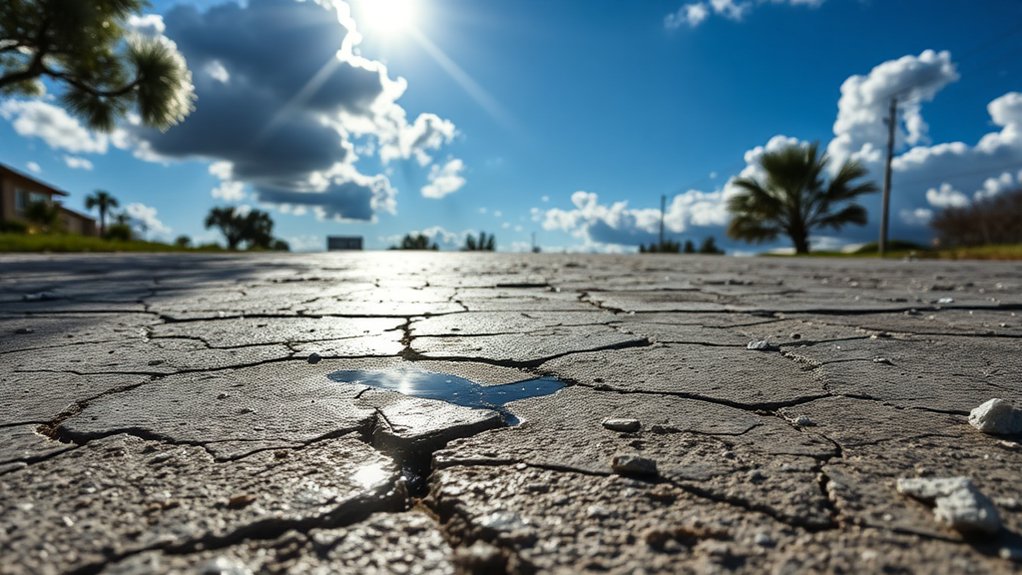
When considering the lifespan of a concrete driveway, the climate plays a crucial role in its durability. Extreme temperatures can affect hydration; high heat may lead to rapid curing, weakening the concrete, while cold weather can cause frost damage.
In areas with freeze-thaw cycles, water that seeps into the concrete can freeze, leading to cracks. Additionally, excess moisture from heavy rainfall can compromise the structure, particularly in regions with poor drainage.
To ensure longevity, it’s important to adjust your concrete mix and application methods according to your climate. In colder regions, you may need to implement extra protective measures, whereas in hotter areas, careful management is required to prevent weaknesses.
Maintenance Practices for Longevity
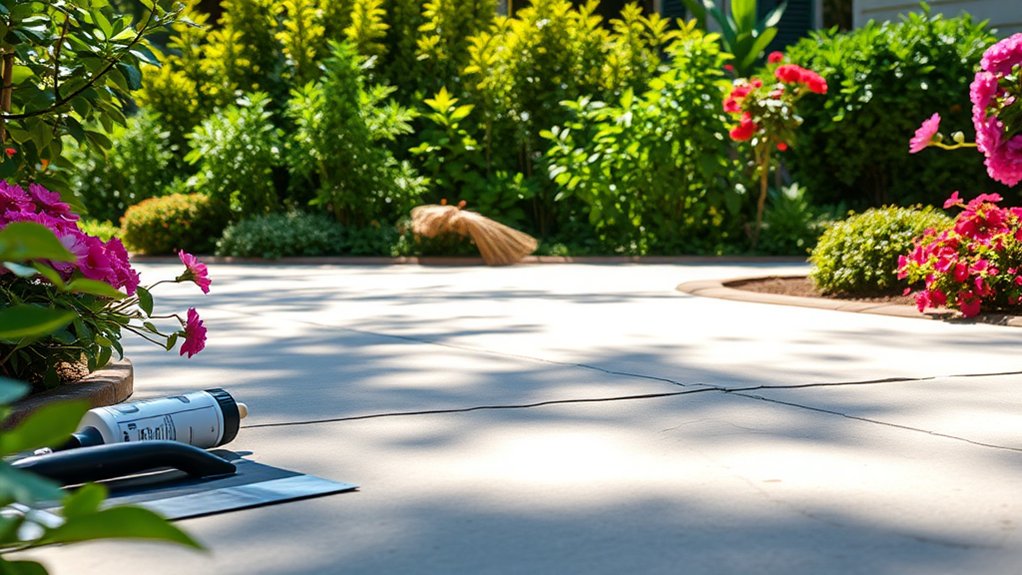
Proper maintenance is vital for prolonging the life of your concrete driveway.
By employing effective cleaning and sealing methods, you can significantly boost its durability. Here are three essential practices to consider:
1. Regular Cleaning: Use non-acidic cleaners and a pressure washer with eco-friendly detergents to remove dirt and prevent stains.
Address spills promptly to avoid lasting damage.
2. Sealing: Apply a suitable sealant 30 days after installation to protect against moisture and contaminants.
Reseal high-traffic areas every few years as necessary.
3. Load Management: Avoid parking heavy vehicles and ensure weight is distributed evenly to prevent structural damage.
Common Repair Techniques
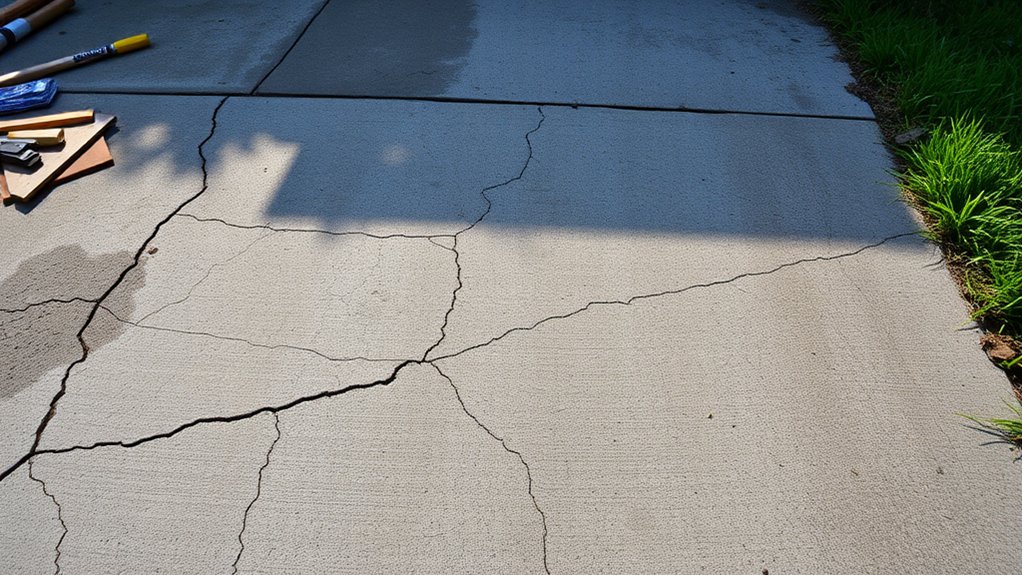
When dealing with cracks in your concrete driveway, it’s important to use effective methods for filling and resurfacing.
You can opt for various materials, such as masonry concrete fillers and resurfacing products, to improve both the strength and appearance of your driveway.
Knowing your repair options helps maintain its integrity and prolongs its lifespan.
Crack Filling Methods
Cracks in concrete driveways can be effectively managed using various filling methods tailored to different sizes and types of damage. Proper preparation is vital to ensure the durability of your repairs.
Here are three common filling methods:
- Polyurethane Caulk: This is ideal for flexible sealing of small to medium cracks.
- Epoxy-Based Fillers: Best suited for deep cracks, these provide strong bonding when combined with aggregates.
- Acrylic Sealers: These not only fill small cracks but also offer a protective layer.
Before applying any filling materials, ensure that the cracks are thoroughly cleaned and dried, removing any debris and loose concrete.
This preparation maximises adhesion and prolongs the life of your repairs, helping to keep your driveway in excellent condition.
Surface Resurfacing Techniques
To keep your concrete driveway in good shape, it’s often necessary to do more than just fill cracks; surface resurfacing can significantly improve its condition.
Overlay techniques are perfect for badly damaged surfaces, offering a strong bond and options for texturing or stamping. If you’re after a more attractive look, stamped concrete resurfacing can imitate natural materials, although it requires specialised tools and skills.
For areas with heavy foot or vehicle traffic, epoxy coatings provide excellent durability and chemical resistance, available in a range of colours.
Micro-topping resurfacing gives a smooth finish suitable for both indoor and outdoor settings. Each method varies in complexity and cost, so the right choice depends on your driveway’s condition and your desired result.
Comparing Concrete and Asphalt Lifespan
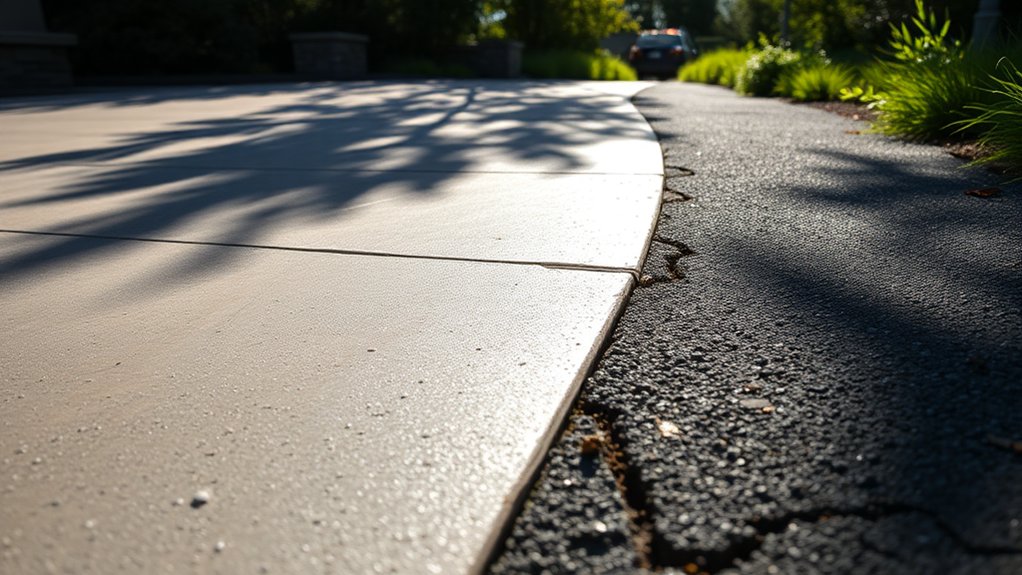
When it comes to driveways, concrete and asphalt are both popular choices, but they’ve quite different lifespans. Here’s a straightforward comparison:
- Average Lifespan: Concrete can last between 20 to 30 years, whereas asphalt typically lasts 10 to 20 years.
- Durability: Concrete is more resilient under heavy loads, which can enhance both the look and functionality of your driveway.
- Maintenance: Concrete requires less frequent maintenance than asphalt, making it a more sustainable option over time.
Although concrete may have a higher upfront cost, its durability and lower maintenance can lead to savings in the long run.
Therefore, it’s important to consider both sustainability and durability when choosing the right material for your driveway.
The Role of Drainage in Durability
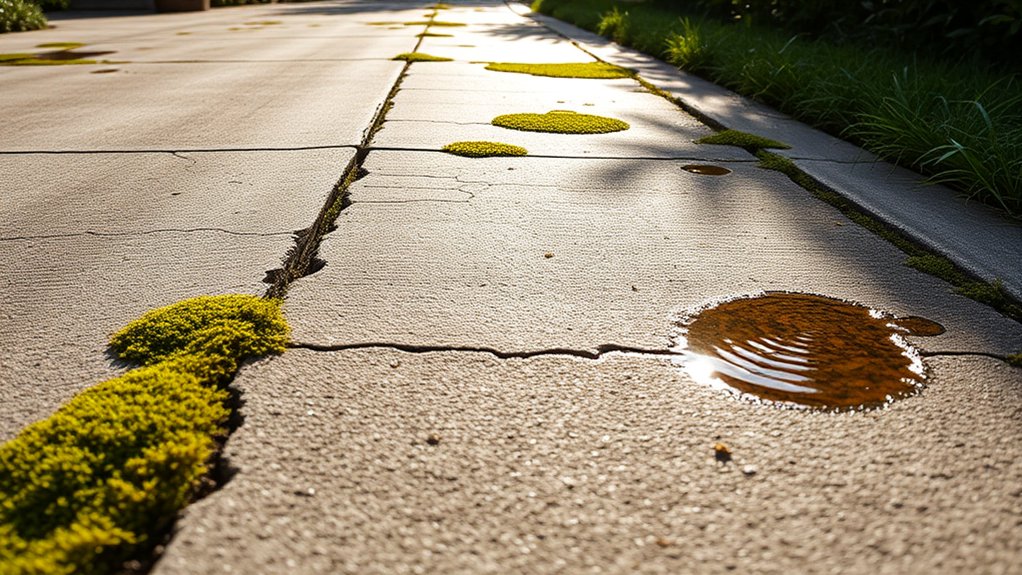
Effective drainage is crucial for ensuring the durability of a concrete driveway. By installing efficient drainage systems, you can manage moisture levels and prevent excessive water build-up, which can weaken the driveway’s structure.
Options like porous concrete and trench drains promote proper water flow, reducing soil erosion beneath the driveway and maintaining its stability.
Proper drainage also helps avoid waterlogged conditions that could diminish the driveway’s load capacity. Selecting suitable materials and strategically placing drains can significantly enhance performance.
Plus, ensuring easy access for maintenance will support long-term functionality. By prioritising drainage, you can minimise maintenance needs and strengthen your driveway, ultimately extending its lifespan and durability.
Effects of Heavy Traffic on Driveway Life
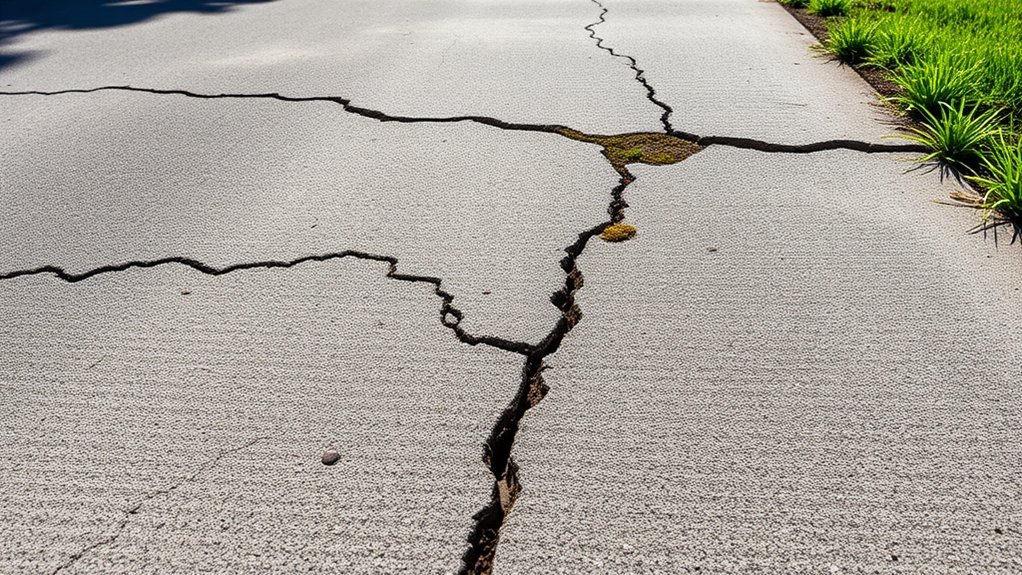
Heavy traffic has a significant impact on the lifespan of a concrete driveway, as the weight of vehicles puts considerable strain on the surface.
This stress can lead to several negative effects:
- Increased Wear: Regular heavy loads speed up wear and tear, which can significantly shorten the lifespan of your driveway.
- Surface Damage: Ongoing pressure can result in cracks and deterioration, particularly if the driveway isn’t well-constructed.
- Structural Integrity: Heavy traffic can compromise the driveway’s structural integrity, leading to serious issues that may require expensive repairs.
To lessen these effects, effective traffic management, such as distributing loads and performing regular maintenance, is essential.
Environmental Conditions and Their Effects
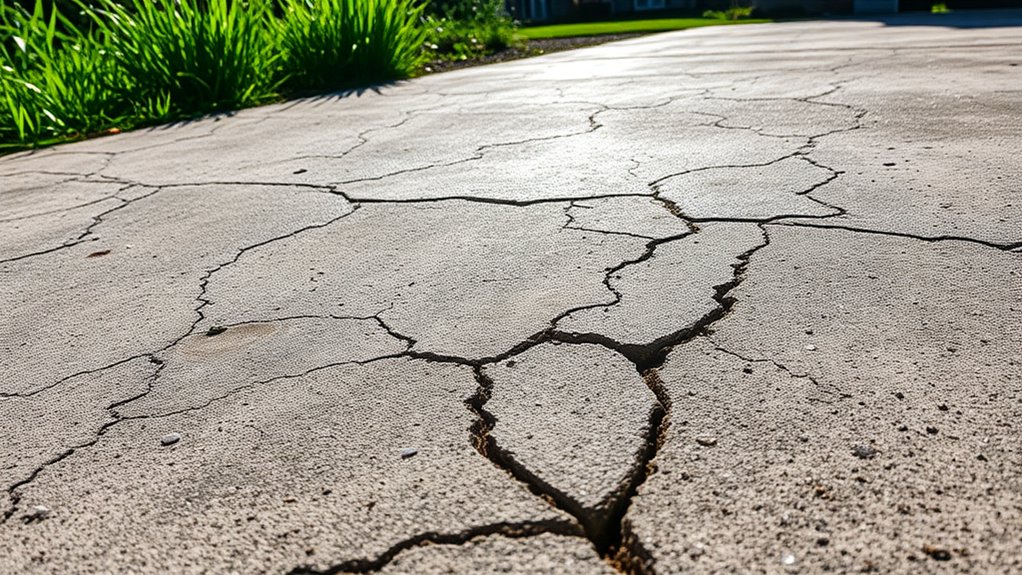
The lifespan of a concrete driveway is significantly affected by environmental conditions, which can introduce stresses that hasten deterioration. Factors such as UV radiation, freeze-thaw cycles, and heavy rainfall can undermine durability. Adopting sustainable practices and following environmental regulations can help reduce these impacts.
| Environmental Factor | Effect on Driveway Durability |
|---|---|
| UV Radiation | Causes fading and discolouration |
| Freeze-Thaw Cycles | Leads to cracking and damage |
| Heavy Rainfall | Encourages erosion and weakness |
| Vegetation | Roots can exert pressure, causing damage |
For instance, prolonged exposure to sunlight can make your driveway look worn and faded. Similarly, in colder months, water can seep into cracks, freeze, and expand, leading to further damage. Heavy rain can wash away the surface, while tree roots can push up from below, causing uneven surfaces. Taking care of your driveway with these factors in mind can extend its life significantly.
Enhancing Durability Through Proper Design
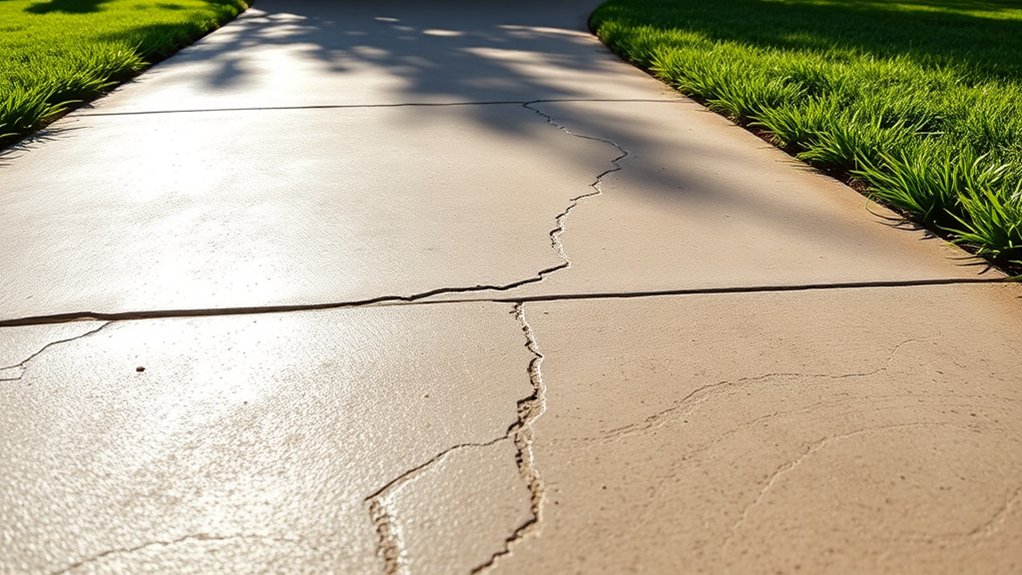
When designing a concrete driveway, paying close attention to key design elements can significantly improve its durability.
Here are some essential considerations to ensure longevity while maintaining an attractive appearance:
- Site Preparation: Clear away any debris and vegetation, excavate to the necessary depth, and compact the soil to create a solid base.
- Reinforcement and Joint Planning: Use rebar or wire mesh to increase tensile strength, and include control joints to minimise cracking.
- Curing and Surface Protection: Keep the concrete moist during the curing process and apply a high-quality sealer to shield against the elements.
Frequently Asked Questions
Can I Install a Concrete Driveway Myself?
Yes, you can install a concrete driveway yourself. However, it requires a good understanding of concrete mixing, proper site preparation, and the ability to handle tools effectively. Be ready for hard work and a significant time commitment to ensure a quality finish. For instance, if you’ve ever laid paving stones, you’ll have a sense of the effort involved, but working with concrete can be even more demanding.
What Are the Signs of a Deteriorating Concrete Driveway?
Look out for crack patterns that suggest structural issues and any surface discolouration that may indicate deterioration. Spotting these signs early is crucial for maintaining your driveway and extending its lifespan. Regular inspections are key.
How Can I Improve My Driveway’s Drainage?
Is your driveway turning into a water feature? Improve drainage by installing channel drains and ensuring proper surface grading. Redirecting water will keep your driveway intact and prevent those annoying puddles.
Are There Eco-Friendly Sealants for Concrete Driveways?
Yes, there are eco-friendly options for concrete driveways available in the UK. Sealants can offer benefits such as lower VOC emissions, better moisture resistance, and increased durability. Products like GreenSeal Pro 500 and NatureShield provide sustainable choices without sacrificing performance.
What Seasonal Maintenance Is Recommended for Concrete Driveways?
Seasonal maintenance for concrete driveways involves regular cleaning to remove debris and checking for cracks, particularly during temperature changes. It’s important to seal the surface and manage drainage to extend the life of your driveway and keep it in good condition. For example, clearing leaves in autumn can prevent staining and damage. Regular upkeep can save you from costly repairs in the future.
Conclusion
In conclusion, a concrete driveway can last for decades if you pay attention to key factors such as installation quality, materials, and local climate. Think of it like a solid bridge that endures over time; neglecting its upkeep can lead to cracks and deterioration. By ensuring proper design and drainage, you’re not just investing in a driveway, but in the long-term value of your property. With the right care, your driveway can remain a dependable pathway for many years.
Just how long can you expect your tarmac driveway to last? Discover key factors and maintenance tips that can extend Read more
How to enhance your gravel driveway's stability and durability? Discover key strategies that can transform your drive into a long-lasting Read more
On a budget? Discover how block paving and concrete driveways compare in costs and long-term value—your wallet might thank you!

